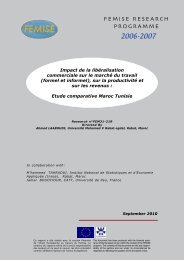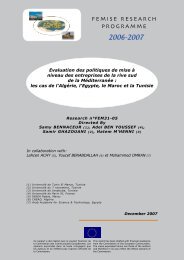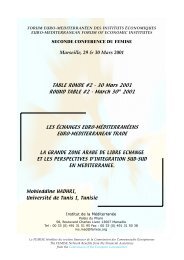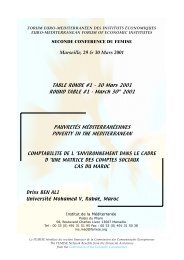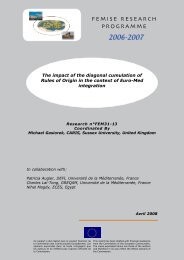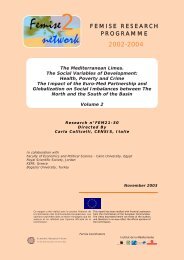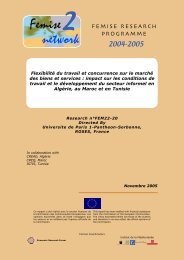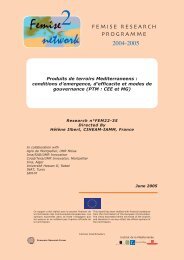Download the report - Femise
Download the report - Femise
Download the report - Femise
You also want an ePaper? Increase the reach of your titles
YUMPU automatically turns print PDFs into web optimized ePapers that Google loves.
physicians from Liberia practice in <strong>the</strong> US or Canada. While Nigeria suffers from <strong>the</strong><br />
lack of medical doctors, <strong>the</strong>re are more than 21000 Nigerian doctors practicing in <strong>the</strong><br />
United States alone.<br />
Ihekweazu et al., (2005) find that approximately 40% of <strong>the</strong> graduates from medical<br />
schools during <strong>the</strong> years of 1995, 1996, and 1997 had migrated abroad about 10 years<br />
after graduation. Devlo (2005) adds that “Significant increases in <strong>the</strong> migration of health<br />
professionals have occurred in recent years but monitoring of emigration flows is<br />
difficult, as few countries keep adequate statistics. Dovlo and Nyonator (1999) 88<br />
estimated that between 1986 and 1995, 61% of doctors who qualified from one medical<br />
school in Ghana left <strong>the</strong> country. Of <strong>the</strong>se, 6.2% had migrated to ano<strong>the</strong>r African country<br />
(South Africa), but most went to <strong>the</strong> United Kingdom (55%) or <strong>the</strong> United States of<br />
America (35%). Huddart and Picazo (2003) 89 indicate that 840 out of 1200 doctors<br />
trained in Zimbabwe in <strong>the</strong> 1990s left <strong>the</strong> country and 17% of locally trained physicians<br />
and dentists left <strong>the</strong> Sudan in <strong>the</strong> 1980s and 1990s. In <strong>the</strong> case of Ghana, <strong>the</strong> physicians<br />
had left within 10 years of qualification, after working less than a third of <strong>the</strong> expected<br />
duration of <strong>the</strong>ir services.”<br />
Oyowe (1996) cites that around 60% of all Ghanaian trained doctors in <strong>the</strong> 1980s did<br />
leave <strong>the</strong> country, and that 17% and 20% and 30% of, respectively, doctors, dentists and<br />
university lecturers in Sudan had left <strong>the</strong> country. In a <strong>report</strong> of <strong>the</strong> OECD (2006), it was<br />
estimated that African and Caribbean countries registered <strong>the</strong> biggest loss in terms of<br />
medical doctors and related professionals. The African countries most cited as <strong>the</strong> most<br />
concerned with this migration are <strong>the</strong> countries where conflicts or wars were taking<br />
place: Mozambique, Angola, Sierra Leone, United Republic of Tanzania and Liberia.<br />
Siringi (2001) <strong>report</strong>s that in 1996, out of 5000 doctors, only 4400 stayed home.<br />
Migration seems to particularly plague countries such as Guinea Bissau, Sao Tome and<br />
Principe, Senegal, Cape Verde, Congo, Benin and Togo. As for <strong>the</strong> Caribbean, <strong>the</strong><br />
countries where <strong>the</strong> migration of doctors has been <strong>the</strong> most felt are Cuba and Barbados,<br />
88 Dovlo D, Nyonator F: Migration of graduates of <strong>the</strong> University of Ghana Medical School: a preliminary<br />
rapid appraisal. Human Resources for Health Development Journal 1999, 3(1):45.<br />
89 Huddart J, Picazo O: The health sector human resources crisis in Africa: an issues paper. Washington DC:<br />
USAID Bureau for Africa, Office of Sustainable Development; 2003.<br />
! *'&!



